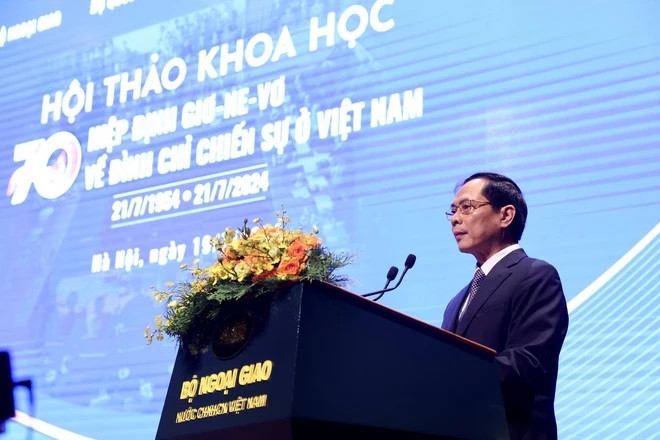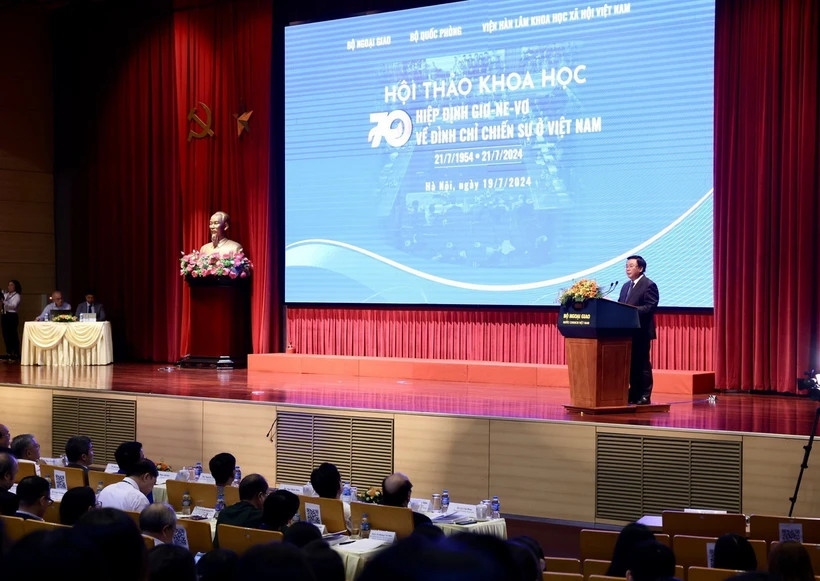Symposium talks historical stature and significance of 1954 Geneva Agreement
VOV.VN - The Ministry of Foreign Affairs, in collaboration with the Ministry of National Defense and the Vietnam Academy of Social Sciences, hosted a symposium in Hanoi on July 19, highlighting the historical stature and significance of the 1954 Geneva Agreement the Cessation of Hostilities in Vietnam.

In his opening remarks, Minister of Foreign Affairs Bui Thanh Son noted that 70 years ago, on July 21, 1954, the Geneva Agreement on the Cessation of Hostilities in Vietnam was signed in Geneva, Switzerland, becoming an important historical milestone in the cause of national liberation and reunification.
This marked the first time that Vietnam’s young diplomatic sector participated in a multilateral international conference, alongside representatives of five world powers from the Soviet Union, China, France, the UK, and the United States.
In the complex international context, the Vietnamese delegation showed their bravery and steadfast stance on the cause of national independence, while skillfully negotiating and resolving thorny issues such as military zoning, general elections, and national unification, along with resistance forces in both Laos and Cambodia.
After 75 days of negotiations and a series of bilateral and multilateral meetings, on July 21, 1954, the agreements on cessation of hostilities in Vietnam, Laos, and Cambodia were signed, forcing France to withdraw its troops, ending the war of aggression and marking the collapse of colonialism in the region.
Son affirmed that the process of negotiating, signing, and implementing the Geneva Agreement constituted a handbook that contains many valuable lessons relating to foreign affairs and demonstrates the unique identity of Vietnamese diplomacy that was inherited, creatively applied, and promoted in the negotiation, signing, and implementation of the 1973 Paris Agreement later, as well as the present cause of national construction and defence.
Summarising historical lessons from the process of negotiating, signing, and implementing the 1954 Geneva Agreement is of practical significance, contributing to examining, building, and perfecting the theoretical methodology for foreign affairs and diplomacy in the Ho Chi Minh era, along with building, perfecting, and implementing the Party’s foreign policy in new stages of national development, said the diplomat.

Taking the floor, Prof. Dr. Nguyen Xuan Thang, a Politburo member and president of the Ho Chi Minh National Academy of Politics, emphasised that the Geneva Agreement was the pinnacle of victory for Vietnamese diplomacy, particularly as it affirmed the legitimacy of the struggle for the cause of national liberation and the peace-loving spirit of the Vietnamese people.
For the first time in history, major world powers participating in the Geneva Conference recognised and committed to respecting basic national rights of sovereignty, independence, unity, and territorial integrity of Vietnam, Laos, and Cambodia, said the official, who is also director of the Party Central Committee for Theoretical Council.
According to the official, 70 years have since passed, the historical significance of the Geneva Agreement on the cessation of hostilities in Vietnam remains fresh, with extremely valuable lessons drawn.
These can be viewed as the lessons of maintaining and strengthening the Party’s leadership; promoting the combined strength of all forces on the negotiating table, maintaining independence and self-reliance; grasping President Ho Chi Minh’s teaching “Firm in objectives, flexible in strategies and tactics”; bringing into full play the strength of the great national unity bloc; raising high the flag of righteousness; and combining national strength with the strength of the times.
At the symposium, delegates affirmed that the Geneva Agreement was the pinnacle of victory in Vietnamese revolutionary diplomacy in the resistance war against French colonialism. Presentations highlighted the scope and significance of the agreement for the Vietnamese revolution and the world revolutionary movement, appreciated the values and lessons learned of the Agreement, and aroused the desire to build a rich, democratic, prosperous, civilized, and happy country whilst steadily moving towards socialism.



